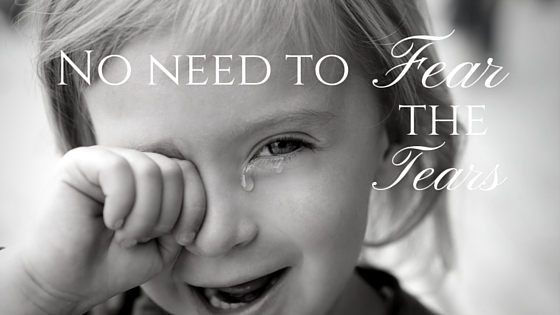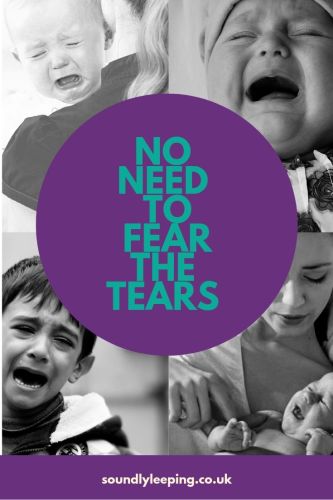No Need To Fear The Tears
Posted on

I have a Facebook group of loving caring yet sleep deprived mums with little ones who struggle to sleep.
Over the last few months, conversation in the group has been brief but when discussion has arisen a common theme other than sleep often appears. The topic of crying.
I’m pleased to say that within my group a lot of the mums adopt a more gentle approach to sleep shaping.
Im all for helping and encouraging positive sleep habits and associations but i believe we can use gentle and respectful ways to help pur kids sleeep rather thanjust leaving them to cry and ' self soothe' my work with children as it’s my belief that babies and toddlers don’t need sleep training. Babies and toddlers will sleep the best way they know how in the circumstances there in.
They‘re children, very young children.
They’re learning and developing and know no better. Innocent.
I believe that it’s my role as a night nanny and sleep coach to “train” parents. Teach them what is normal for a baby/ toddler and sleep and how to help shape sleep habits that encourage a healthy relationship with sleep.
 Over the years in my work I’ve realised there’s a common misconception that once babies pass 10/11/12 months of age, sleep ‘issues’ should pretty much disappear. Babies from this age “should” be able to sleep overnight, through the night, all night every night. right?
Over the years in my work I’ve realised there’s a common misconception that once babies pass 10/11/12 months of age, sleep ‘issues’ should pretty much disappear. Babies from this age “should” be able to sleep overnight, through the night, all night every night. right?
but that is sooooo not the case ( I'm sure you already know that if youre reading this. )
While it is very true that many babies can and do sleep through the night. Some from as early as 2 or 3 months old and, can maintain regularly sleeping through for a while, NORMAL development comes in, new learning processes, emotions develop, situations and circumstance change and a baby or toddlers sleep is affected.
My point is….it’s not so much that babies or toddlers have sleep problems. It’s more a situation of the development of sleep as well as all over areas of development in your little one are constantly changing and aren’t mature yet. We don’t expect a 2 and a half year old to have the language skills and vocabulary of an adult. They don’t have the physical control over their body or limbs or skills of an adult. So why would we expect them to sleep, like adults do?
I digress
Crying is a common topic. Completely understandable. Little ones cry! That’s a given… they’re communication skills are immature and so crying is the main way they communicate.
Picture this.
Your 18 month old is allergic to nuts, very common allergy right?
You’re out in the supermarket your little one is roaming around the isles toddling along, touching and looking and smiling at people while you both walk along the isles. You get to check out and there’s a stack of peanut chocolate bars lined up, all in colourful packaging and totally enticing to an 18month old. R right at eye level of your toddler and he makes a beeline for it……He picks it up. He can play with it, it’s in a wrapper…… but has not going to be eating it!
So now you have to separate this chocolate bar that looks more like a toy from your toddler……..
And so come the tears……and it doesn’t matter how much he cries he flat out can’t have the chocolate bar…..it could make him seriously ill. So what do we do?
We calm him down, offer a substitute maybe. A big cuddle lots of reassuring words right. He didn’t get the chocolate bar, there was no way he was getting the chocolate bar and he was mad about it….but he got over it and in 20 mins he didn’t even remember he wanted the chocolate bar in the first place.
Even the coolest of kids will have a meltdown at some point or other and we as parents deal with it. We can’t avoid it, if a toddler doesn’t understand something, is upset, angry, frustrated, irritable or TIRED, they cry. It’s there go to response. They know no better as we as parents totally get that!
But that’s during the day.
At night, crying and how WE feel about it as parents takes on a different meaning.
Speaking from my own perspective as a parent, when my child would wake up and cry out overnight. It would totally alarm me. I could manage her crying during the day, its normal but at night the sound of her crying was heart breaking, and as any parent does when you’re tired and your baby is crying, you do whatever you can to stop the crying as quickly as you can.
And that’s not wrong.
Any loving parent feels it within at the sound of their child crying at the best of times. But I know I always wanted to do whatever I could to make everything better for my daughter and calm her down. Particularly at night.
Many times in our urgency and fear of this crying or tears we unknowingly reinforce negative sleep habits that work in the short term……but long term? Create a difficult night life for everyone in the house.
The crying element is never going to change, and even when we introduce positive sleep habits and have toddlers that are wonderful little sleepers. We will still have nights when they wake up crying, we will still have nights when they’ll need us.
I think how we respond to those cries and our thinking behind it needs to change a little……. With a little shift in our perspective and how we approach crying at night we can perhaps find the whole prospect of shaping our little ones sleep so much less stressful. After all half the stress of a problem is not the problem itself but our attitude towards it. Would you agree?
Now I’m not for a moment suggesting that you consider unsafe and potentially harmful practises such as controlled crying or cry it out methods as a way of dealing with crying and overnight waking.
What I am suggesting is stopping for a moment and thinking about what your child’s cry is communicating to you.
If you have decided to try a new method of getting your little one to sleep and you are met with tears don’t immediately panic, give up or assume that something is wrong. Out yourself in your child shoes for a moment
……”.Its 3am I've woken up in the dark, I’m half asleep but half awake, I can’t see anything, the house is completely silent and I don’t know where my mum is….. OMG where’s my mum and dad…….”
And he cries
You hear him and you respond to him, you might pick him up or just pat him on his back
….”ah mum thank God I was so scared……hold on….. why you patting me on my back you don’t usually do that……I’m tired I want to go back to sleep feed me/rock me/ take me into your bed like you usually do…….no I don’t like this new way , I’m not used to it…this is new…I don’t like this new way it unfamiliar to me……”
That could be one of the many things that could be running through your child’s mind when you try to adopt a new approach to settling them. Now remember when I said that crying was your toddler communicating…..when someone communicates with you or is talking to you, you stop and you listen….. Then if what you heard requires a response, you respond….
Consider the above scenario overnight when your child is frustrated because they don’t yet understand what you’re doing when making a change to they’re habits. What you are doing is new to them, They don't yet understand it, they’re not entirely sure what’s going to happen next and it unnerves them not if you as their parent are feeling uncertain of what you’re doing, perhaps a little anxious about it yourself….No doubt about it your toddler will intuitively respond to those feelings within you and react….making the whole process much much angst ridden and stressful
Sometimes the response from a parent at that very moment should be similar to the allergy scenario I mentioned earlier…….You respond to their frustrations and lack of understanding by being there physically in presence and being consistent in your approach. But not by giving in and reverting to previous methods because you can’t bear to hear them cry. By doing so, you’re doing your little one and yourself a disservice. Confusing your little one and making the entire process last longer than need be. Consistency reinforces your new way of doing things, by being repetitive and consistent your child quickly learns and understands what’s going to happen next and so the tears will lessen and lesson.
It’s not bad to allow your child to cry, you’re merely listening to what they’re communicating, with a view to understanding them and choosing the right way to respond. You should ALWAYS respond when your child needs you! Period.
But responding is not always about stopping those tears, if your responding to your child those tears will stop. And when you are responding think about how and what your response is communicating back to your child. What does your demeanour/aura /energy or as well as your words or actions communicate to your child. Be confident that what your doing will work in and you will be amazed at how fast your child picks up on that and is comforted by it. Sounds a bit farfetched? Disagree? Tell me your thoughts I’d love to know what you think.
Do you agree with me? What do you think. Comment below your thoughts;
Come join the discussion in my FB group here

